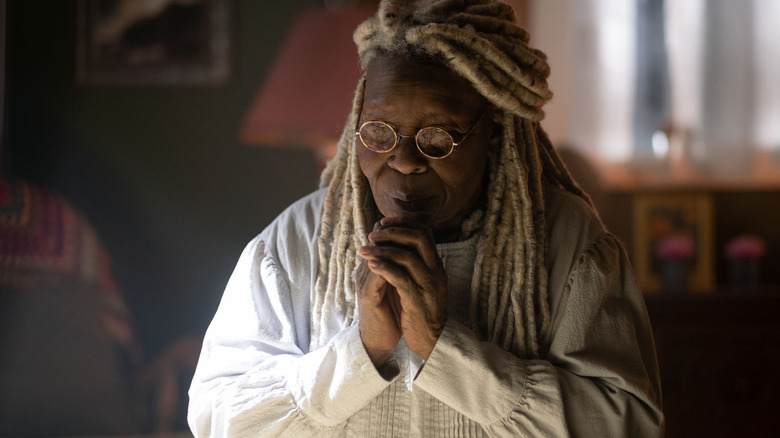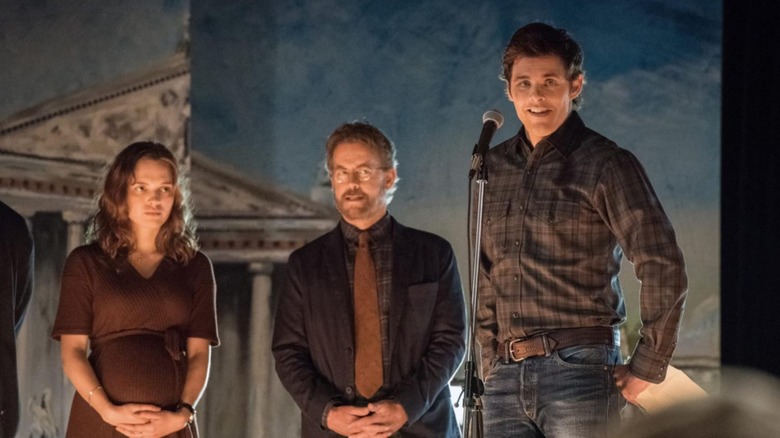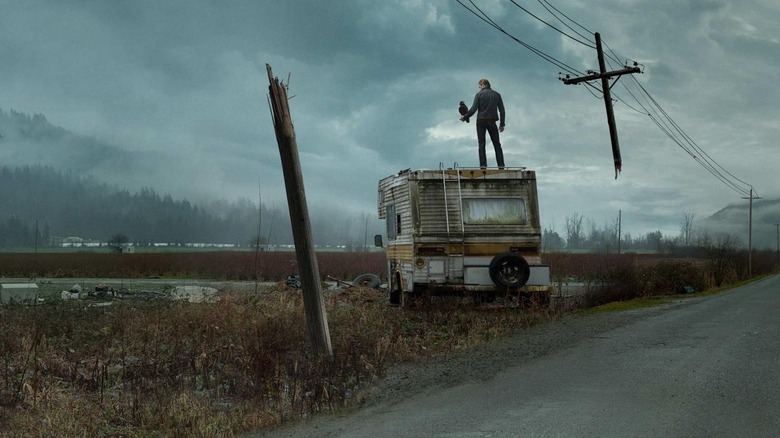The Stand Miniseries Let Stephen King Correct A Major Regret
As of 2022, Stephen King's novel "The Stand" — originally published in 1978, then expanded and reworked extensively in 1990 — remains the author's longest. If anything, King is prolific. The novel, a whopping 1,153 pages in length, is an apocalypse story about an eternal struggle between the forces of good and evil, with hundreds of members of humanity serving as their moral foot soldiers. The story follows a vast cast of characters as they respond to a potent virus that quickly wipes out the majority of humankind. The Earth's scant survivors eventually gather together into one of two camps, representing good or evil.
"The Stand" has been tinkered with multiple times since its initial publication. In addition to King's own expansion, the book was adapted for television in 1994 in an all-star, four-episode miniseries, as well as into a Marvel comic book in 2008. In 2020, Paramount+ mounted a remake miniseries, also with an all-star cast, this time running a full nine episodes. "The Stand" remains the only Stephen King story to have been adapted into a TV miniseries twice. Fun trivia: Metallica took the title of their album "Ride the Lightning" from "The Stand."
The 2020 miniseries differs from all the previous iterations in one vital element: The ending has been changed. The ninth episode of the series, called "The Circle Closes" includes a coda to the story that King didn't include in either version of his novel. In a 2020 interview with EW, King revealed he took the opportunity to get on a record an ending very reminiscent of "The Last Temptation of Christ." The character of Frannie is given a miniature epilogue of her own.
Frannie doesn't know
Prior to the conclusion of the 2020 miniseries, Stephen King had to be coy about the ending, other than to say it was going to be different from the book. In King's original novel, the story concludes when a member of the "evil" faction drives a nuclear bomb into the middle of Las Vegas, where all the "evil" people have gathered. Several "good" characters escape just in time to see the bomb obliterate the entire city and kill off the "evil" people. The book ends with the characters of Frannie and Stu conversing about the morally unstable nature of humankind. Will humanity ever learn to gather as a singular tribe, or is our tendency to split, argue, and destroy each other too fundamental a part of ourselves to truly abandon? Frannie's only answer is "I don't know."
In his celebrated 2000 essay "On Writing: A Memoir of the Craft," King admits that the "I don't know" was born of an inability to write anything that didn't sound corny or preachy. He felt "The Stand" should end without a moral, leaving humanity somewhat adrift. It may be here that King's own notorious inability to end his stories strongly began. Some 40 years on, King, who wrote "the Circle Closes" himself, seems to have invented a more elegant, appropriate ending. At first, he teased the new ending, telling EW:
"I was able to bring things back around. I've had an idea for that final episode that I always kind of regretted not writing it in the book — the book's long enough as it is. I can't tell you anything about the episode other than to say that I've seen a rough cut of it, and I think it's fine."
Green Knight, 25th Hour, Last Temptation of Christ
With "The Circle Closes," however, Stephen King seems to have added an epilogue that, while still not providing a clear moral, seems to have shut the book on "The Stand" once and for all.
The new ending of "The Stand" resembles the flash-forward montage as seen in films like Martin Scorsese's "The Last Temptation of Christ," Spike Lee's "The 25th Hour," and David Lowery's "The Green Knight." In each, the main character of the story is granted a moment of reflection wherein they imagine making a different decision than the one they are making, and they are permitted to live out a very different and much more pleasant life. In each case, the protagonist must ultimately make the more difficult decision in order to retain their honor.
In "The Stand," Frannie (played in 2020 by Odessa Young) falls down a well and is greeted by the ghost of Randall Flagg (Alexander Skarsgård), the devil figure of the story. Flagg offers her, in Mephistophelean fashion, an evil blessing of certainty. She will know her child will grow up safely — in exchange for a kiss. Frannie acknowledges that certainty is a lie, and she rebuffs him. Frannie is rescued by the ghost of the godly character, Mother Abigail (Whoopi Goldberg).
The ghost of Mother Abigail equips Frannie with what King always wanted to put in place of that "I don't know," saying instead: "The wheel turns, the struggle continues, and the command is always the same. Be true. Stand."
There is still no clear moral to the story, but there is a clear acknowledgement that, on a long enough timeline, the struggle with evil will arise repeatedly. Humanity is no longer adrift. Now they have a mandate: Stand.


